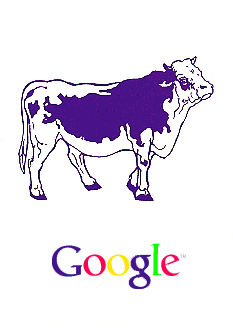November 19, 2006
#articles

The statistics are all over the Internet; products created by Google quickly lose steam after the initial burst of buzz. GTalk, the MSN messenger killer, for example, has only 50k active users! In a previous article, I concluded that Google must continue its rapid innovation but also put a tap on its uncontrolled product releases. In this article, I will give more reasons why.
The idea is simple. All great products deserve great marketing. Google's only marketing tool, though, is its awesome brand; the success of any other product created by Google depends on the buzz generated by this brand. However, for Google's other products to be truly successful, they must be marketed aggressively. Moreover, for a brand to be successful, it must avoid creating "other" products in the first place!
Well, Google does neither and that kills me. Read the full article here.Over 25 years ago, IBM's *accidental* visit to Microsoft ultimately ended up making Bill Gates the richest person in the world [1]. Was luck the only reason attributed to his success? No way. Though without it, Bill Gates might have been working for Apple today. I have a theory; for something to be successful a large series of coincidences must sum up exactly right...at least, such was the case with companies such as Microsoft and Google. In that regard, the difference between Microsoft and Google is that Microsoft's luck ran out while Google's luck continued to flourish. Indeed, God worked in mysterious ways for Google; ever since its emergence in 1998, Google has repeatedly scored high on luck [2]. That is not to say that Google didn't deserve its dramatic rise to success; on the contrary, a successful company seeks out opportunities. Taking advantage of an opportunity means recognizing that there is an opportunity to take advantage of. For the purpose of this article, I will reveal a few unpredictable events that led Google on its road to riches but were, more or less, a coincidence.
Related content
- Migliori Casino Online
- Siti Slot Online Sicuri
- Casino Italiani Non Aams
- UK Casino Sites Not On Gamstop
- Non Gamstop Casino Sites UK
- Meilleur Casino En Ligne
- UK Casino Not On Gamstop
- Online Casinos
- Non-gamstop UK Casinos
- Casinos Without Gamstop
- オンラインカジノ ランキング
- Best Non Gamstop Casinos
- UK Online Casinos Not On Gamstop
- UK Casino Not On Gamstop
- Casino Not On Gamstop
- Casino En Ligne Fiable
- Beste Online Casino
- Non Gamstop Casino
- Casino Not On Gamstop
- Casino Sites UK Not On Gamstop
- UK Online Casinos Not On Gamstop
- Betting Sites Not On Gamstop
- Casino Non Aams
- Casinos Not On Gamstop
- Gambling Sites Not On Gamstop
- Jeux Casino En Ligne
- Casino En Ligne Belgique
- Casino Non Aams
- Meilleur Site De Poker En Ligne
- Tennis Paris Sportif
- 出金の早いオンカジ
- 비트코인 스포츠베팅
- คาสิโนคริปโต
- Casino En Ligne 2026
- Meilleur Casino En Ligne France
- Casino Online Non Aams
- Meilleure Casino En Ligne
- Meilleurs Casino En Ligne
- Nouveau Casino En Ligne 2026
- Meilleur Casino En Ligne Suisse
